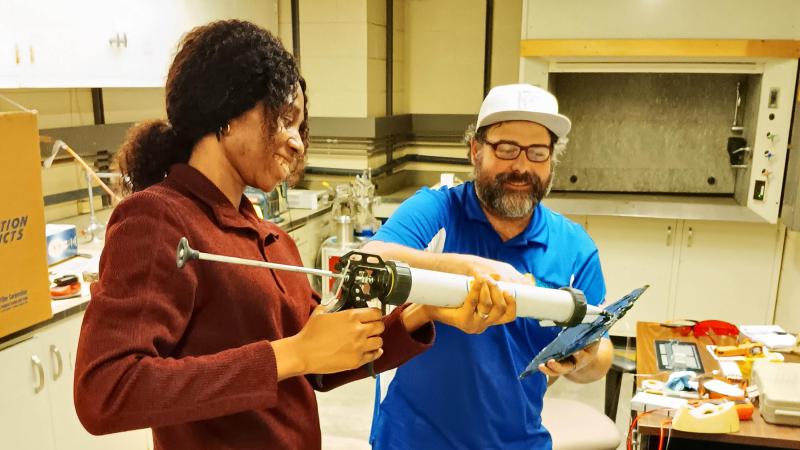A graduate student at Rensselaer Polytechnic Institute imagines a world where solar energy is more accessible.
August 19, 2024

Ozioma Ozioko, a doctoral student at Rensselaer Polytechnic Institute, is on a mission to give her home country of Nigeria — and the rest of the world — ready access to solar energy.
“Growing up, the power supply was very unstable. Sometimes we could go for a week without power. I remember my brothers and I doing our homework by the light of a kerosene lamp,” Ozioko said. “Nigeria has abundant solar energy resources, but the cost-effective utilization of these resources is a challenge. I want to change that.”
Ozioko first became interested in solar power when she received a scholarship to attend a local high school, which, unlike the area where she lived, had more consistent power.
“One day I asked one of my teachers why we had more constant power at school than in my home. That was when I learned that many places in Nigeria rely on gas-powered generators for electricity, and my school was no exception. My teacher then introduced me to the idea of solar power as a source of clean energy,” she said.
Ozioko went on to pursue her bachelor’s and master’s degrees in mechanical engineering from the University of Nigeria. As an undergraduate, she studied the feasibility of replacing the country’s fossil fuel power plants with solar power, and as a master’s student she investigated ways to optimize flat plate solar collectors, devices that convert solar power into heat that can be used in homes and buildings.
Those experiences led her to pursue a doctorate at Rensselaer under the direction of Diana Borca-Tasciuc, Ph.D., professor in the Department of Mechanical, Aerospace, and Nuclear Engineering. Now in her second year of her Ph.D. program, Ozioko is researching the use of nanostructures in luminescent solar concentrators (LSCs), devices that trap and concentrate light to small area photovoltaic (PV) cells. They can be used on building side walls as an inexpensive and aesthetically appealing alternative to plain PVs.
However, LSCs have yet to reach efficient light trapping and Ozioko’s goal is to improve their performance and design systems that can be widely adopted.
“The exciting thing about integrating LSCs to building walls is that material wastage is significantly reduced, and a whole building wall can be made to generate electricity. This could reduce the need for solar farms, which require a lot of space, to produce solar power,” Ozioko said.
As part of her doctoral work, Ozioko is collaborating with SolaBlock, a Massachusetts and New York company that integrates solar technology into masonry.
“Over the past few months, Ozioma has started to tackle an increasingly important problem: PV degradation at higher temperature, an issue of growing significance in today’s changing climate. PVs are directly exposed to sun and get hot quickly. Integrating PVs into systems that can store thermal energy, such as the masonry used in SolaBlock products, or LSCs, can help reduce PV temperature rise, thereby increasing their performance and extending their lifespan," said Borca-Tasciuc.
Being a recipient of many scholarships over her academic career, including the most recent Anthony Ihedoha Anaebere, Sr. Memorial Scholarship, Ozioko credits her success to the many organizations and mentors who supported her along the way. Chief among her mentors and supporters is her mother, who encouraged her at a young age to follow her passion for science and technology.
“I have been very blessed and privileged,” Ozioko said. “My advice to girls and women considering a career in science and engineering is, ‘If you believe you have the capability, just go for it. You don’t need to have every detail of your career path figured out to get started.’”
After completing her doctorate, Ozioko, wants “to go back to Nigeria and start my own solar power company, promote solar deployment and accessibility, and contribute to the country’s growth,” she said. Her hope is to contribute to making Nigeria a country where solar energy is abundant, affordable, and aesthetically pleasing.